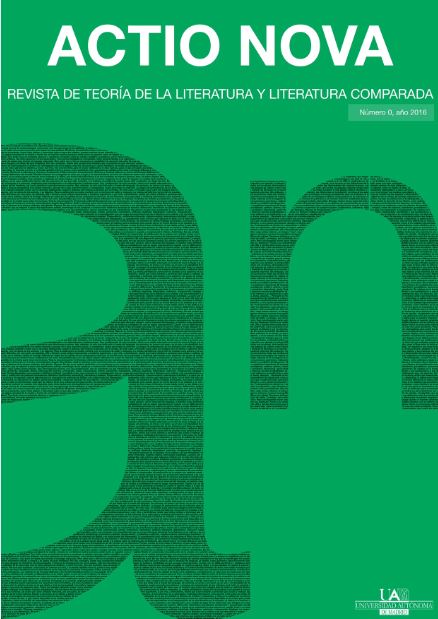Keywords:
Digital humanities, The hour of the reader, The reader as confabulator, Reading as experience, MultisensorialCopyright (c) 2016 ACTIO NOVA: Revista de Teoría de la Literatura y Literatura Comparada

This work is licensed under a Creative Commons Attribution-NonCommercial 3.0 Unported License.
Abstract
Literary theory must once again open its wings. Digital reading is asking for a place in our cultural podium. It demands its own status, a different one than that of the traditional reading on printed paper. We have to expand the concept of Humanities to the one of Digital Humanities, but sadly enough the majority of the research projects submitted for funding are loaded with requests for hardware and software, and very little is related to improve the interpretation of works of art, the principal task of the humanities. I propose a few ways for developing a new type of reading for the digital age, based on reading as experience, a way of reading that makes us confabulators. The meaning of the words is complemented by the multisensory elements mentioned in the texts, like images, colors and sounds, through the links of the hypertext. Also, we offer a few ways to improve our remembrance of literary digital texts.
Downloads
References
Aguirre Carballeira, Arantxa (2006): Buñuel, lector de Galdós, Las Palmas de Gran Canaria, Cabildo Insular de Gran Canaria.
Allington, David, Sarah Brouillette y David Golumbia (2016): «Neoliberal Tools (and Archives): A Political History of Digital Humanities», Los Angeles Review of Books 01-05-2016,
https://lareviewofbooks.org/article/neoliberal-tools-archives-political-history-digital-humanities (fecha del último acceso: 9 de octubre de 2016).
Borràs, Laura y Carlos Lindín (2015): Hermeneia. Electronic Literature Directory, http://directory.eliterature.org/e-lit-resource/252 (fecha del último acceso: 8 de septiembre de 2016).
Bourdieu, Pierre (1998): La distinción Criterio y bases sociales del gusto, Madrid, Taurus [1979].
Butler, Christopher (1994): Early Modernism, Literature, Music and Painting in Europe 1900-1916, New York, Oxford University Press.
Castellet, Josep Maria (2001): La hora del lector, edición de Laureano Bonet, Barcelona, Península.
Cela, Camilo José (1957): La obra literaria del pintor Solana, http://www.rae.es/academicos/camilo-jose-cela (fecha del último acceso: 8 de septiembre de 2016).
Cervantes, Miguel de (1944): Don Quijote de la Mancha, ed. de Martín de Riquer, Barcelona, Editorial Juventud. Ha tenido múltiples reediciones.
Chartier, Rogier (1994): El orden de los libros. Lectores, autores, bibliotecas en Europa entre los siglos XIV y XVIII, Barcelona, Gedisa [1992].
Fergusson, Francis (1961): «Introduction», en Aristotle’s Poetics, New Yok, Hill and Wang.
Foer, Joshua (2011): Het geheugenpaleis, Amsterdam, De Bezige Bij.
Goldsmith, Kenneth (2011): «It’s Not Plagiarism. In the Digital Age, It’s ‘Repurposing’», The Chronicle of Higher Education, September 11, 2011, http://www.chronicle.com/article/Uncreative-Writing/128908 (fecha del último acceso: 9 de octubre de 2016).
Gullón, Germán (1998): «Una lectura cultural de la poesía española de vanguardia», en Fernando Cabo Aseguinolaza y Germán Gullón (eds.): Teoría del poema: La enunciación lírica, Amsterdam, Rodopi: 205-216.
Gullón, Germán (2003): El jardín interior de la burguesía. La novela moderna en España (1885-1902), Madrid, Biblioteca Nueva.
Gullón, Germán (2004): Los mercaderes en el templo de la literatura, Madrid, Caballo de Troya.
Gullón, Germán (2010): El sexto sentido. La lectura en la era digital, Vigo, Academia del Hispanismo.
Habermas, Jürgen (1989): El discurso filosófico de la modernidad, Madrid, Taurus [1985].
Hoffman, Donald (2015): Charla TED. «¿Vemos la realidad tal como es?», https://www.ted.com/talks/donald_hoffman_do_we_see_reality_as_it_is?language=es (fecha del último acceso: 3 de septiembre de 2016).
Hutcheon, Linda (1988): A Poetics of Postmodernism. History. Theory. Fiction, New York - London, Routledge.
Jiménez, Juan Ramón (2005): Edad de oro, introducción, edición y notas de Germán Gullón y Heilette van Ree, en Juan Ramón Jiménez: Obra poética, volumen II: Obra en prosa, Madrid, Espasa-Calpe.
Kahneman, Daniel (2012): Thinking Fast and Slow, London, Penguin Books.
Kerckhove, Derrick de y Cristina Miranda de Almeida (eds.) (2014): The Point of Being, Newcastle upon Tyne, Cambridge Scholars Publishing.
McGann, Jerome J. (1992): A Critique of Modern Textual Criticism, Charlotesville - London, University of Virginia Press [1983].
Ortega y Gasset, José (1991): La deshumanización del arte y otros ensayos de estética, Madrid, Alianza [1925].
Pérez Galdós, Benito (2015): Doña Perfecta, Madrid, Espasa-Calpe [1876].
Pérez Galdós, Benito (2006): Tristana, Madrid, Espasa-Calpe [1892].
Safranski, Rüdiger (2009): Romanticismo. Una odisea del espíritu alemán, Barcelona, Tusquets [2007].
Searle, John (2003): «Minds, Brains and Programs», http://cogprints.org/7150/1/10.1.1.83.5248 (fecha del último acceso: 4 de septiembre de 2016).
Searle, John (2012): «Consciousness», http://faculty.wcas.northwestern.edu/~paller/dialogue/csc1.pdf (fecha del último acceso: 4 de septiembre de 2016).
Soto Femenía, Carlos (2016): El carbonero, Barcelona, Destino.
Tortosa, Virgilio (2015): «¿Hacia un canon de la literatura electrónica?», 1616. Anuario de la Sociedad Española de Literatura General y Comparada, 5: 25-44.
Turello, Dan (2015): «Brain, Mind, and Consciousness: A Conversation with Philosopher John Searle», https://blogs.loc.gov/kluge/2015/03/conversation-with-john-searle (fecha del último acceso: 4 de septiembre de 2016).
Vilariño Picos, María Teresa y Anxo Abuin González (2006): Teoría del Hipertexto. La literatura en la era electrónica, Madrid, Arco/Libros.
Voltaire (1971): Candido [Candide], Traducción de Leandro Fernández de Moratín, Madrid, Editorial Libra [1759].
Woolf, Virgina (2009): El lector común. Barcelona, Lumen [1925].
Woolf, Virgina (2016): Horas en una biblioteca, Barcelona, Seix Barral [1916].
White, Hayden (1975): Metahistory, Baltimore, John Hopkins University Press.
Wieseltier, Leon (2012): «Voluminous», The New Republic, https://newrepublic.com/article/100979/library-books-paper-texts-voluminous (fecha del último acceso: 4 de septiembre de 2016).
